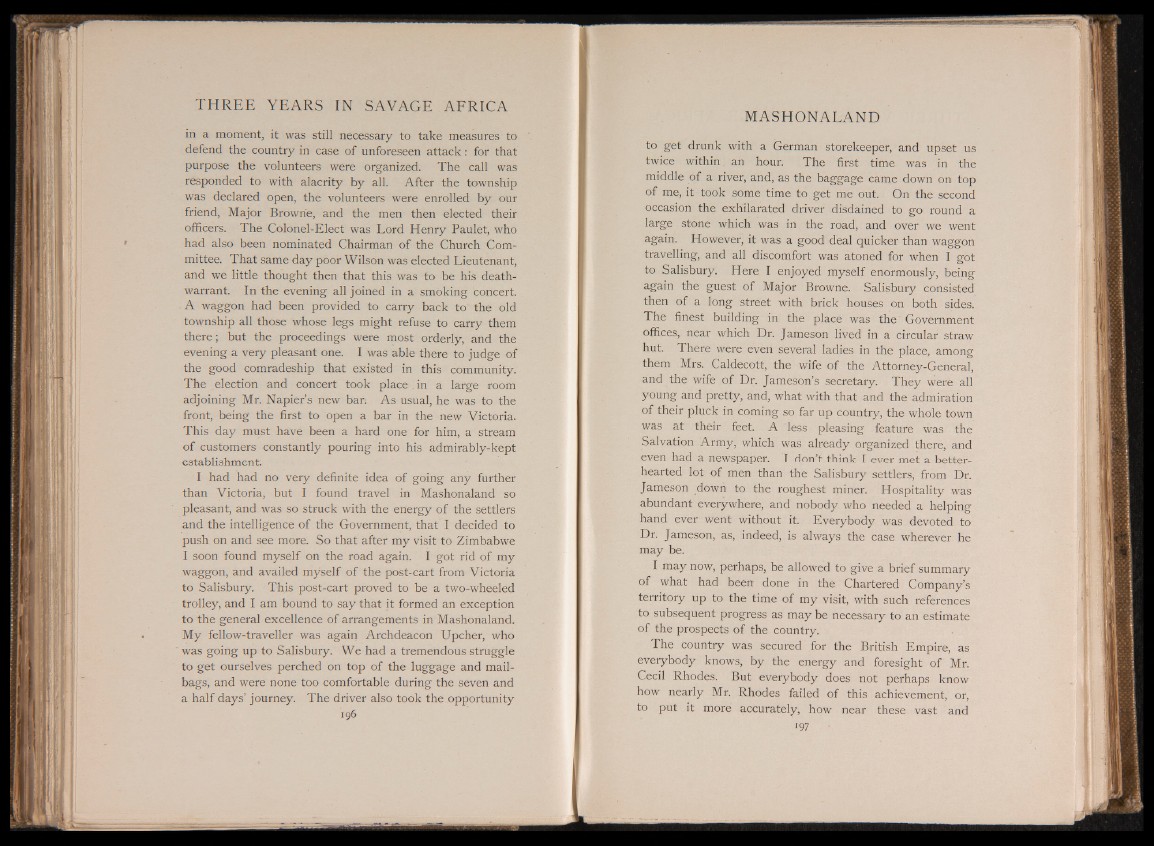
in a moment, it was still necessary to take measures to
defend the country in case of unforeseen attack: for that
purpose the volunteers were organized. The call was
responded to with alacrity by all. After the township
was declared open, the volunteers were enrolled by our
friend, Major Browne, and the men then elected their
officers. The Colonel-Elect was Lord Henry Paulet, who
had also been nominated Chairman of the Church Committee.
That same day poor Wilson was elected Lieutenant,
and we little thought then that this was to be his death-
warrant. In the evening all joined in a smoking concert.
A waggon had been provided to carry back to the old
township all those whose legs might refuse to carry them
there; but the proceedings were most orderly, and the
evening a very pleasant one. I was able there to judge of
the good comradeship that existed in this community.
The election and concert took place . in a large room
adjoining Mr. Napier’s new bar. As usual, he was to the
front, being the first to open a bar in the new Victoria.
This day must have been a hard one for him, a stream
of customers constantly pouring into his admirably-kept
establishment.
I had had no very definite idea of going any further
than Victoria, but I found travel in Mashonaland so
pleasant, and was so struck with the energy of the settlers
and the intelligence of the Government, that I decided to
push on and see more. So that after my visit to Zimbabwe
I soon found myself on the road again. I got rid of my
waggon, and availed myself of the post-cart from Victoria
to Salisbury. This post-cart proved to be a two-wheeled
trolley, and I am bound to say that it formed an exception
to the general excellence of arrangements in Mashonaland.
My fellow-traveller was again Archdeacon Upcher, who
was going up to Salisbury. We had a tremendous struggle
to get ourselves perched on top of the luggage and mailbags,
and were none too comfortable during the seven and
a half days’ journey. The driver also took the opportunity
196
M A SH O N A L A N D
to get drunk with a German storekeeper, and upset us
twice within an hour. The first time was in the
middle of a river, and, as the baggage came down on top
of me, it took some time to get me out. On the second
occasion the exhilarated driver disdained to go round a
large stone which was in the road, and over we went
again. However, it was a good deal quicker than waggon
travelling, and all discomfort was atoned for when I got
to Salisbury. Here I enjoyed myself enormously, being
again the guest of Major Browne. Salisbury consisted
then of a long street with brick houses on both sides.
The finest building in the place was the' Government
offices, near which Dr. Jameson lived in a circular straw
hut. There were even several ladies in the place, among
them Mrs. Caldecott, the wife of the Attorney-General,
and the wife of Dr. Jameson’s secretary. They were all
young and pretty, and, what with that and the admiration
of their pluck in coming so far up country, the whole town
was at their feet. A less pleasing feature was the
Salvation Army, which was already organized there, and
even had a newspaper. I don’t think I ever met a better-
hearted lot of men than the Salisbury settlers, from Dr.
Jameson down to the roughest miner. Hospitality was
abundant everywhere, and nobody who needed a helping
hand ever went without it. Everybody was devoted to
Dr. Jameson, as, indeed, is always the case wherever he
may be.
I may now, perhaps, be allowed to give a brief summary
of what had been done in the Chartered Company’s
territory up to the time of my visit, with such references
to subsequent progress as may be necessary to an estimate
of the prospects of the country.
The country was secured for the British Empire, as
everybody knows, by the energy and foresight of Mr.
Cecil Rhodes. But everybody does not perhaps know
how nearly Mr. Rhodes failed of this achievement, or,
to put it more accurately, how near these vast and
197